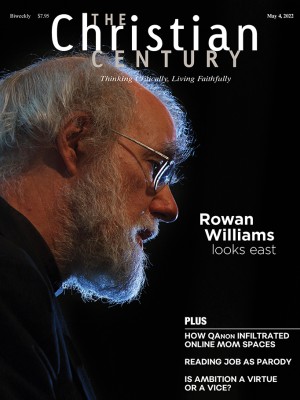How should Asian American Christians respond to anti-Asian racism?
Be like water: clear, humble, persistent, and restorative.

In my hometown of San Francisco, dozens of Asian Americans have been harassed, spat upon, and assaulted since the start of the pandemic, a pandemic for which many have blamed us. Stop AAPI Hate, an organization I cofounded in 2020, has an online tracker for reporting attacks. One 67-year-old individual shared this story:
I was standing in an aisle at [a hardware store] when suddenly I was struck from behind. Video surveillance verified the incident in which a white male using his bent elbow struck my upper back. Subsequent verbal attacks occurred with “Shut up, you Monkey!,” “F**k you Chinaman,” “Go back to China,” “bringing that Chinese virus over here!”
Read our latest issue or browse back issues.
One in five Asian Americans nationwide have experienced such traumatizing, racist attacks over the last two years. One in six cases of the 11,000 incidents reported to SAH involve physical assault, and an additional 8 percent involve people coughing on or spitting at Asian Americans.
Other Americans have reacted to the sight of Asian Americans by directly avoiding us. We’ve been turned away at stores and hotels, shunned on playgrounds, and kept at a distance on public transit.
This fear-based, fight-or-flight reaction has had a devastating impact on Asian Americans. How can we respond?
Asian traditions offer a holistic philosophy that can complement Christian teachings on pursuing God’s justice. Drawing from the wisdom of Asian American elders and from Doris Chang’s research on Taoist therapy, I would argue that our best response is to be “born of water and the Spirit” (John 3:5): to be like water.
Water is clear. “Who can make the muddy water clear?” writes ancient Chinese philosopher Lao Tzu. “Let it be still, and it will gradually become clear.” We need to be still in order to discern the Spirit’s wisdom regarding our current racial moment. Because racism is a complex, historical, and institutionalized set of practices, we need clarity on the sources of racialized fears in order to quell them.
The American pattern of racial violence against Asian Americans and Pacific Islanders has its roots in the perpetual foreigner stereotype, the belief that we are outsiders who are existential threats to the West. Politicians have long invoked anxieties about East Asians (the “yellow peril”) and South Asians (the “husky peril”) in order to reinforce an insider/outsider dichotomy. Their use of orientalism—the stereotypic representation of the East as opposite and inferior to the West—has justified racist policies and legitimated mass dispossession.
In the late 19th century, politicians and popular media represented Chinese immigrants as disease-ridden, heathen pagans who stole White workers’ jobs. Their rhetoric and images stirred the xenophobia that led to the 1882 Chinese Exclusion Act, the first law to bar an entire group from the United States. That legislation didn’t stem anti-Asian violence; it further legitimated it. Within a decade, mob violence drove out more than 200 Chinese settlements along the West Coast.
More recently, former president Trump insisted on using the phrase “Chinese virus,” racializing the coronavirus and turning a biological disease into a Chinese one. Blamed again for threatening the nation’s health, Asian Americans were again targeted for personal attacks and exclusionary policies. The Trump administration banned Chinese researchers, suspended migration visas, cut refugee resettlement, and curtailed H-1B visas for professionals. Each of these policies disproportionately hurt Asians and treated us as outside threats to America’s national security and public health.
We need to start by being clear about this: when politicians use racism to influence their supporters, they perpetuate it and cause real harm.
Water is humble. It does not force its own way; it bends toward the path of least resistance. The Tao Te Ching says, “The best people are like water, which benefits all things and does not compete with them. It stays in lowly places that others reject.” This is a theme in the Gospels as well. Jesus, who blesses the meek (Matt. 5:5), exemplifies the humility of water that is yielding.
With the yielding, soft attitude of water, we can learn how to deal with those who perpetrate racist violence. Instead of reacting with a fight-flight response of our own, which just perpetuates the cycle, we can try to see our enemy with empathy—since we all hold implicit biases.
Last year a driver hurling racial epithets chased Boyung Lee, the academic dean of Iliff School of Theology in Denver, for blocks. The incident provoked so much fear that Lee didn’t leave her home for weeks. Over time, though, with the help of her faith community and prayer, she has come to a different place. She recognizes that her perpetrator may have been hurt by institutional racism, too, she told me: “I still have anger, but not much fear. I feel much more sadness about his upbringing, his education, his mind and the system he’s in.”
If Lee were to see her assailant again, she said, “I would say, ‘Please remember that God created you and said you were good. You are called to be God’s partner to build God’s kingdom where God’s will is done here. God not only created you good, but everyone God has created is good.”
Only a heart that is humble and yielding, such as Lee’s, can stop racism’s cycle of fight or flight. Her humility enabled her to see her perpetrator as a partner of God. Humility recognizes that we all hold implicit biases, and we can’t address racism by vilifying individual racist perpetrators. Rather, we focus on changing the institutions and policies that socialize people to scapegoat outsiders and divide us.
Water is persistent. The humility of water does not mean that water is passive. Along with helping us to understand and deal with racial trauma, the way of water can lead to institutional change—through active, faithful persistence.
A Chinese fable highlights this virtue. Annoyed by two mountains, an old man digs at them with a hoe. When neighbors chide him about the futility of his efforts, he acknowledges that he might not finish in his lifetime. Yet with his hard work, followed by his children’s and that of the generations to follow, the mountains would eventually be removed. Impressed by his perseverance, the gods move the mountains.
Jesus says that if we have “faith as small as a mustard seed,” we can move mountains (Matt. 17:20). I used to think that the faith of which Jesus speaks leads to miraculous, instantaneous change. But from the Chinese fable’s perspective, this powerful faith involves perseverance over the long haul. It’s faith that amounts to “confidence in what we hope for and assurance about what we do not see” (Heb. 11:1).
I’ve seen how God has used the long-term efforts of a few individuals to galvanize institutional change. For the last 30 years, a group of us have been praying for Asian American Christians to come together and do justice. We’ve seen God’s answers to that prayer. In the past two years, the Asian American Christian Collaborative gained 20,000 individuals—across the theological and political spectrums—to repent over America’s anti-AAPI violence. The Asian American centers at Princeton and Fuller seminaries have developed as institutions, further promoting the development of theological narratives that disrupt stereotypes.
With the support of Christian scholars and graduate students, Stop AAPI Hate has built a global movement for racial justice. In California, we worked with 150 AAPI organizations to obtain $166 million in the Asian and Pacific Islander Equity Budget bill, which addresses current and historic racism. The state legislature of New York is now considering a similar bill. Elsewhere, grassroots efforts in Illinois and New Jersey succeeded in requiring Asian American studies in K–12 schools.
Just as water’s persistence can wear away obstacles, over time our faithful efforts can remove barriers of injustice. In racial solidarity and in the fellowship of the saints, we can make waves of change. As long as we do not “grow weary in doing good, in due time we will reap” (Gal. 6:9). What we reap will be the restoration of our communities.
Water is restorative. California’s Death Valley is the hottest place on earth. Yet when atmospheric rivers shower the desert, super blooms of flowers cover the dunes. They create such a spectacular explosion of color that NASA releases satellite photos to share their glory.
We as the church have the opportunity to be water for our nation. Along with the persistence to effect real justice, this ultimately involves restoration: nurturing the nation to health and reconciling it toward harmony.
So much racist policy embodies the fight-flight response to fear. But “perfect love casts out fear” (1 John 4:18). Because of this love, we can promote policies of hospitality for migrants and refugees. We can address racism directly in our classrooms and churches instead of evading it, because restorative love compels us toward justice. We can offer racial reparations for wrongs of the past, because we value our communities more than our self-interests.
Trauma responses of fight or flight perpetuate America’s racist cycle of violence. Jesus’ way of water offers a different answer to racism. As we gain clarity about racism’s sources, we can identify positive strategies and solutions. With this clarity, humility, and persistent faith, followers of Jesus may be restorers of our communities.
A version of this article appears in the print edition under the title “Be like water.”





